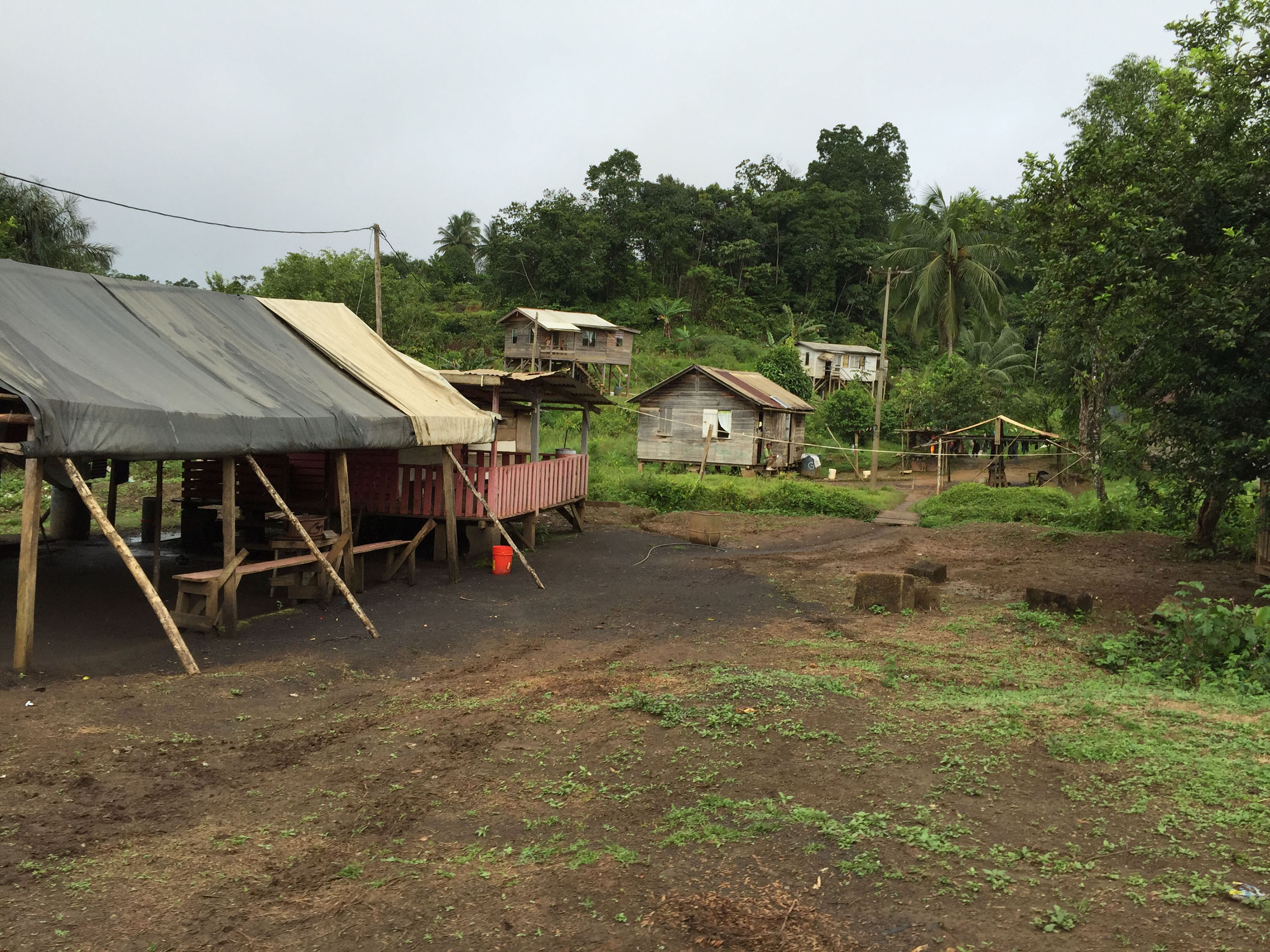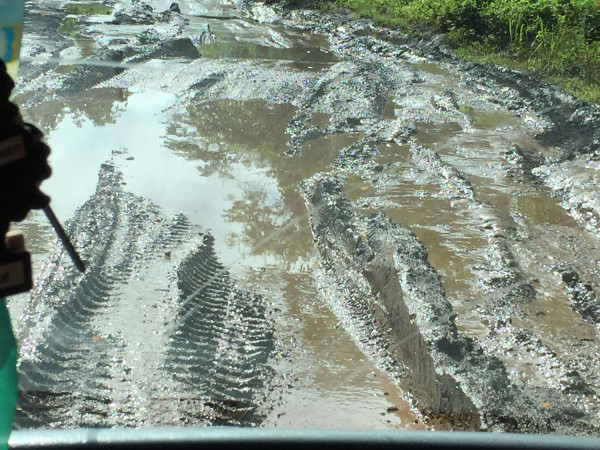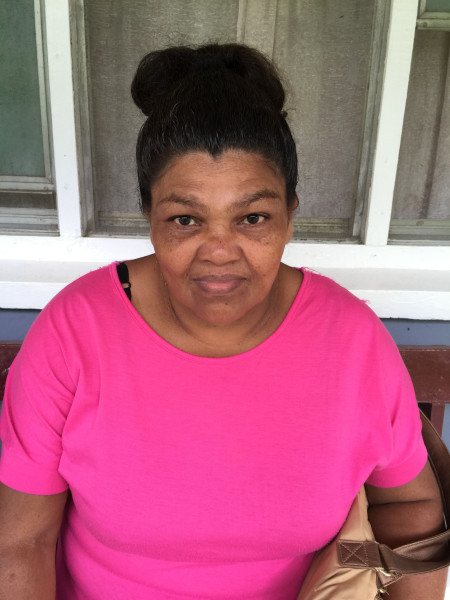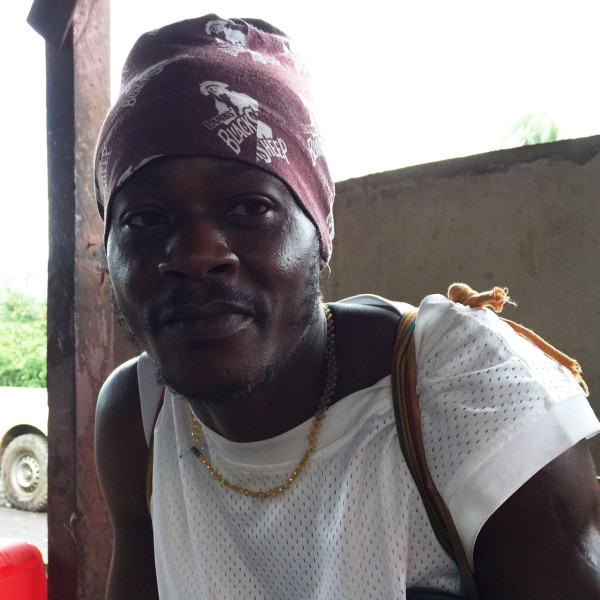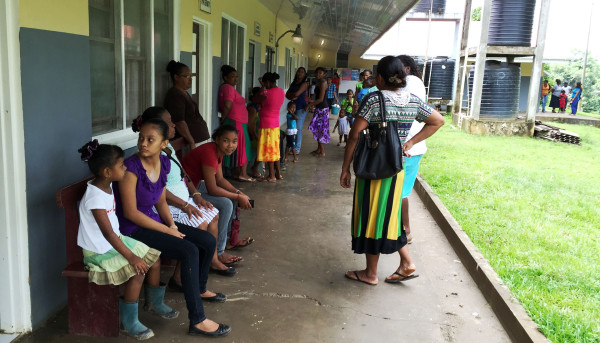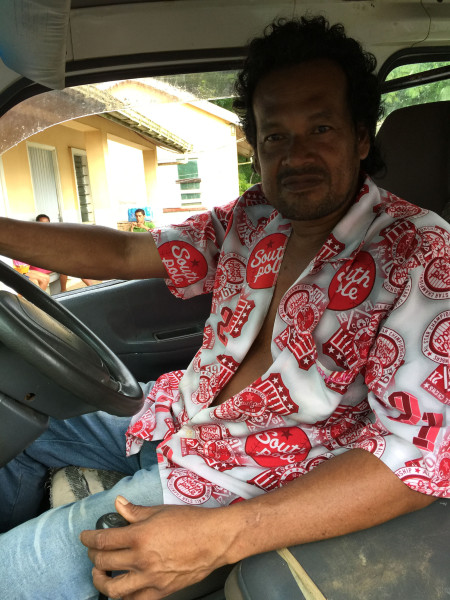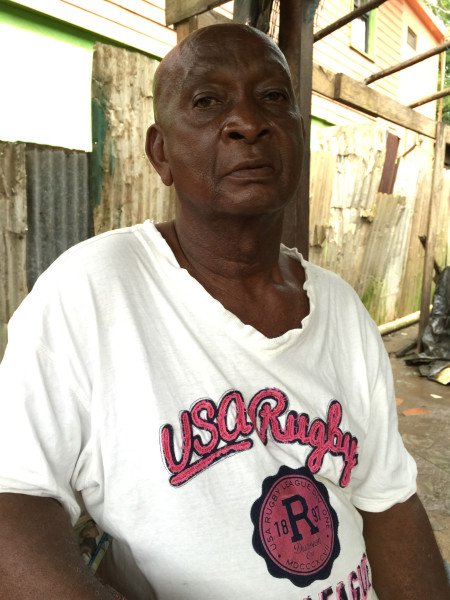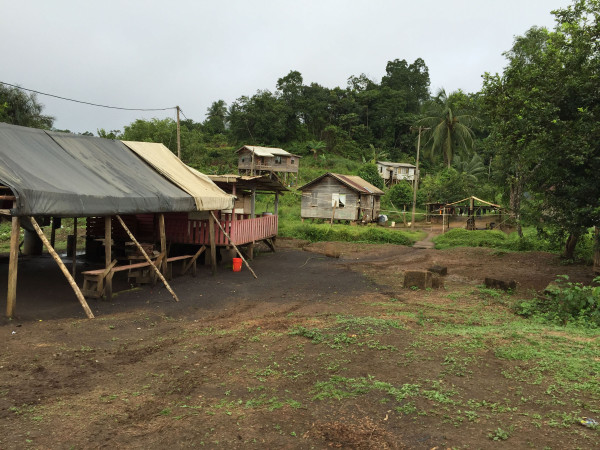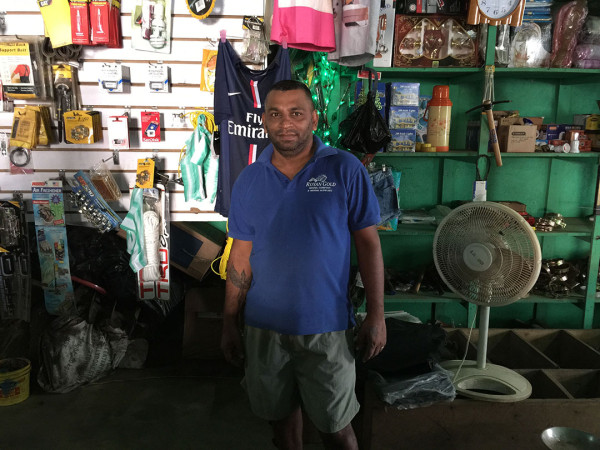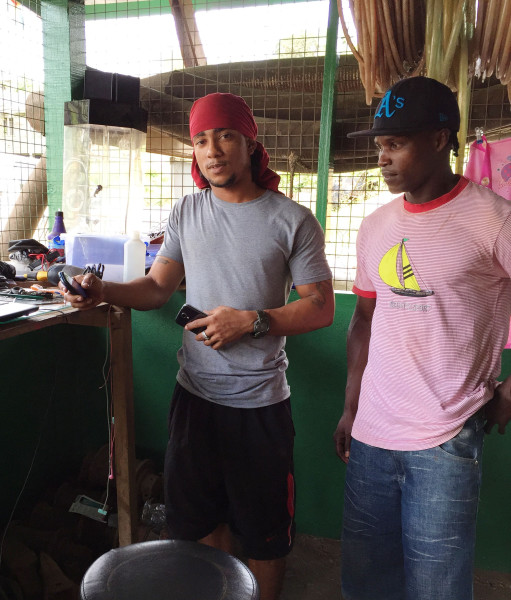Story and photos by Shabna Ullah
Mathews Ridge, North West District with its hills, mountains and pristine rainforest is magnificent, its people are friendly and hospitable, but the community has a common problem – the state of its main road.
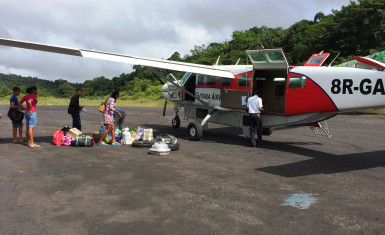
Large trucks, residents said, contribute to the destruction of the road but they are aware that there is no other way to transport goods and fuel to the community.
The deplorable road is suitable mostly for 4×4 trucks and all-terrain vehicles (ATV).
As we left the airstrip, it appeared as though it would be smooth sailing, but less than quarter of a mile away reality struck. We encountered a section where we thought the minibus we were travelling in would have never made it through. We were even more disheartened when the driver informed us that it would be like this “right through.” However, we eventually made it safely to Hell Hill without being stuck.
As we stood on the road in front of the Shell Nic, Nell Hotel, a resident told us, “Over here is Hell Hill and over there is Heaven Hill,” referring to two sections of the community.
One man explained that Heaven Hill was named for residents who had biblical names while Hell Hill was named for the rowdy and aggressive people who moved into the area.
Onika Anessa Smithet is employed at the hotel that is owned by Lloyd La Cruz, who also operates a grocery shop in the backdam where he stays most of the time.
Smithet is originally from Matthews Ridge but had left several years ago to live on the Linden Highway.
Five years ago she started working at the hotel, which also provides a restaurant and catering service and has a boutique and grocery store attached.
Patrons told this newspaper that they were impressed with the cleanliness and the ambiance of the hotel and restaurant, which give a welcoming feeling.
To help maintain its standard, the owner of the hotel has placed a sign in front which urges patrons to: “Get rid of some mud off your attire. Management would refuse your patronage if you refuse to comply with our request.” An area is provided for guests to wash off before entering.
With a huge part of the road being made from clay, getting muddied is unavoidable, especially when it rains heavily like it did when we visited. Without its proactive signage and wash area, the hotel would be a mess.
“We try to keep the place clean and up-to-standard so everybody can be comfortable when they come here,” Smithet said.
Down in the village there seemed to be no lack of businesses including grocery shops, a mining and hardware store, Digicel store and a Digicel tower that provides an efficient service as well as a boutique and cell phone repair services. The village also has mechanic shops, gas stations, a wash bay service and snackettes. A skills training centre where the women used to learn to create various craft items is no longer operating.
In the afternoons, the youth would hang out at the community centre ground and play a game of cricket or chat on the pavilion. There is also a primary school in the village.
Opposite the community centre ground, on another hill is the police station, while, a short distance away, is the Pakera District Hospital where the doctor’s quarters is currently being renovated, a nurses’ hostel and other government buildings nearby.
Hospital
Residents access the hospital for various ailments but complicated cases are transferred to the Georgetown Public Hospital or medivaced in cases of emergency.
A former health worker who preferred to remain anonymous told the World Beyond Georgetown that the health care system has a lot of room for improvement. He said, “The hospital was a well-established institution that had surgical capacities back in the days.”
Residents are proud that one of their very own is serving as a doctor at the hospital. Dr Damian Fraser, 27, worked at the Georgetown Public Hospital for 18 months after completing his medical studies in Cuba and moved to his hometown in February.
As the only doctor at the hospital, his work can get challenging at times, but he does not complain. It was always his dream to become a doctor and he feels “passionate about helping fellow community members.”
He also sees his accomplishment as “an opportunity to be a role model for the youngsters in the community.” He hopes that they can follow him and obtain a good profession.
“I think it would be motivating for them that if I was born and grew up here and I can achieve my goals then they can do it as well. But a lot of them end up working in the gold fields without reaching far in their education,” he said.
He feels that “with the current mining situation, gold mining has no scope; there is hardly any room for actual development. It is not always something definite; sometimes when they do earn, it is to pay their debts.”
He also urged the young people to “aim for jobs to bring in a steady income and have stable employment.”
His mother, Adriana Fraser operates a small grocery shop to supplement her husband’s income as miner. He engages in metal detecting.
The woman who has eight other children, said another son is an assistant pharmacist while another is studying engineering. The other children are still at school.
Vicky (only name given) who operates a hardware and mining shop in the village said the gold price has fallen from $10,000 to $9,000 per pennyweight. His business is affected because “prices keep going up for items.”
Vicky moved from the East Coast Demerara with his family two years ago to set up business and although it is slow he still likes it there because of its peace and quiet.
Adrian Campbell also left his East Coast home 18 months ago in search of work which he said is much easier to get at Matthews Ridge.
He lamented too that the mining business is slow and when there’s no work available, he repairs cell phones from a small work station he has set up in a corner of Vicky’s store.
Wilfred Campbell, 71, a retired plumber, helps to overlook a shop belonging to his son and daughter-in-law. He was busy checking off goods for miners to take to the backdam when this newspaper dropped in.
Campbell is originally from Fyrish, Corentyne, Berbice. He told this newspaper: “I love being up here; here I got to know about money. This is where my children got their initial education before being awarded scholarships to attend schools in Georgetown.
He recalled that when he “moved to the area in 1975 it was very developed. That was when the white people were doing manganese mining.” At that time too the Guyana National Service would have been in operation.
“The roads were also in good condition and the community was clean. Anyone who visited the area always felt happy. It was safer too; you could have left your premises and go out and no one would steal,” he recalled.
At that time too, there were lots of jobs available. The then government was encouraging the planting of cash crops and provision and the rearing of livestock. However, this did not last.
He said too that maintenance for the generators to power the area and the consumption were too high and government invested in smaller ones. But this “only powered the government houses, not the villages and residents started buying their own.”
As we were speaking, a resident, Wayne ‘Cashew’ Williams, proudly displayed a nugget of gold to this reporter. He had just acquired it and was planning to sell it in Georgetown. He said that he has been mining for years. He was just 8 years old when he began ‘mining’ during the school holidays with his father, who is now retired. Williams now works as a mechanic.
We caught up with Miguel Stoll as he rode his ATV in the village. He does gold mining at Five Star in the Backdam. He uses a metal detector to search for gold and other valuable coins and recalled finding a coin that had a lion on it.
He relies on his ATV for his trade as it can “handle the rough road and the jungle.” But he has “turned over many times and I would jump off but I would still injure my hands.” An ATV costs about $3.8 million to $4.5 million while a used one is about $2.5 million, he said.
Stoll lamented the terrible condition of the road and said “We want the government to come and see how it is and we want them to fix the road for us.”
Drivers said they are required to pay $2,000 at a toll gate that leads to different areas like Kaiuni and Eye Lash and stressed that “still nothing is done to improve the road.”
Golin Poliah operates a snackette, selling salted snacks and fresh fruit juices. When the fruits are not available in the area the mother of three purchases them from Georgetown.
She also travels to Port Kaituma by land to purchase goods for her business and pays $60,000 per trip to hire a vehicle. Poliah lamented that the condition of the road makes it difficult.
Her husband provides a transportation service with his 4×4 vehicle mostly to miners. Her daughter, Shemela, served as a Community Support Officer and helped out with the students at school when the teachers went off on training.
She told this newspaper she quit after she was not paid as promised but plans to start again in September because she enjoyed it.
Transportation service
Bryan Peters is on the road all day and handled himself like a pro as he manoeuvred the huge ditches, ponds and potholes on the road with his minibus.
He is one of the residents who operate a transportation service in the community. He also uses his 4 x 4 pick-up truck for the trade that he started 20 years ago.
Other residents provide the service with their ATVs but yet at times there is a difficulty accessing transportation. Many people would trek miles in the thick mud to get to their destinations to cut costs as well.
He feels the North West District is “stagnated because of the road. We can’t go to different villages as we like. Every time we make a run we have to fix something; we spend a lot of money on repairs to vehicles.”
Peters does mostly contract work with the government at the hospital. This newspaper observed that a pickup and another vehicle that were assigned to the hospital were parked in the compound and were not in working condition. This has been the case for a few months now, according to some concerned persons. They would like Health Minister Dr George Norton to visit the hospital and address the situation.
They said he should also “put systems in place for simple things like transportation, food and medical supplies.”
They said, “the condition that it was in about 40 to 50 years ago was rated an eight but now it is rated a three… Basic resources are lacking, for example basic lab tests like haemoglobin are done on a limited scale.”
When this newspaper visited, many residents including those from Baramita had turned out at the hospital for a medical outreach.
Two medical personnel, a sonologist and optometrist had journeyed to the area through the Ministry of Health to serve the community.
About 150 patients benefited all together. It was the first time such a clinic was held and residents asked for it to be done more often.
Residents were also concerned about the supply of water, which comes every other day and the electricity which they said was like “fairy lights.”
